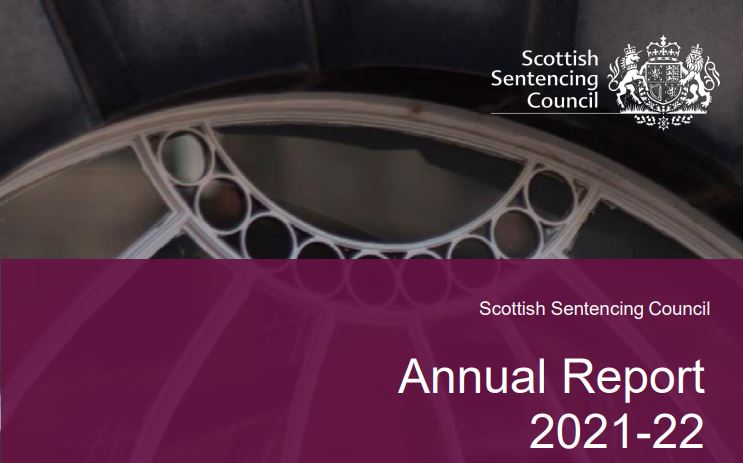New sentencing guidelines marked in Council’s 2021-22 annual report

13 October 2022
The launch of two new sentencing guidelines in 2021-22 was a “significant milestone” for both the Council and sentencing in Scotland, according to the Council’s Chair, Lady Dorrian, the Lord Justice Clerk.
Writing in the Council’s 2021-22 annual report, which was published and laid before the Scottish Parliament on 12 October 2022, Lady Dorrian recognised the significance of the two guidelines developed by the Council which cover the process of sentencing, and sentencing young people.
“This was a significant milestone for both the Council and sentencing in Scotland,” said Lady Dorrian.
“Both guidelines will help to demystify sentencing for the public, provide assistance to the judiciary, and encourage greater consistency in how sentencing is approached.”
The Sentencing process guideline sets out an 8-step process that courts should follow in order to reach a sentencing decision. It is the first time that the various steps courts take in reaching sentencing decisions have been expressly defined in a single document in Scotland. It was approved by the High Court in July 2021 and came into effect on 22 September 2021.
The Sentencing young people guideline applies to the sentencing of those who are under the age of 25 at the date of conviction. It extracts the latest evidence on the development of cognitive maturity in young people and the causes of offending by them, explaining clearly and concisely why they should be sentenced differently from adults. Following its approval by the High Court in November 2021, it came into effect on 26 January 2022.
The annual report notes that the creation of a series of general guidelines setting out a high-level framework for all sentencing decisions in Scotland has been the Council’s primary focus since it was established in 2015. Along with the first general guideline, the Principles and purposes of sentencing, which came into effect in 2018, these two further guidelines completed this framework. This fulfilled a key commitment in the Council’s 2018-21 business plan, marking the end of the first phase of its work and a shift in focus to the development of guidelines on specific offences, as outlined in its third business plan covering the period 2021-24.
The annual report outlines the substantial progress the Council made in its work developing other offence guidelines during 2021-22. A public consultation on a draft guideline covering statutory offences of causing death by driving is currently taking place, giving people a chance to have their say before it is finalised. Work is also ongoing in the development of other guidelines on the offences of rape and sexual assault, and offences in relation to indecent images of children.
In its new business plan, the Council announced that it would prepare a sentencing guideline on domestic abuse offences, a further general guideline on sentence discounting, and would resume work on an environmental and wildlife offences guideline.
While the development of sentencing guidelines remains the Council’s main responsibility, it also assists in the development of sentencing policy and promotes greater awareness and understanding of sentencing.
As part of this work, the Council published a wide range of research in 2021-22, including a report on public perceptions of sentencing for sexual offences, a study on the attitudes of young people to the sentencing of young people in Scotland, and a report on a consultative exercise seeking judicial views on community sentences, including on whether there are any gaps or barriers in the provision of such sentences and what might improve judicial confidence in them.
During the year, the Council further commissioned literature reviews in a number of areas, although the resulting reports were published outwith the period covered by the report. This included literature reviews on offences involving indecent images of children, the challenges of sentencing offenders with mental health issues, the sentencing of offences involving domestic abuse in Scotland, and the challenges of comparing sentencing across jurisdictions.
Lady Dorrian extends her gratitude to all Council members, past and present, for their contributions to the achievements set out in the annual report.

